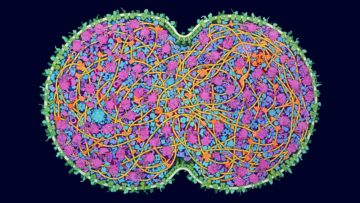Yasemin Saplakoglu in Quanta:
 Seven years ago, researchers showed that they could strip cells down to their barest fundamentals, creating a life form with the smallest genome that still allowed it to grow and divide in the lab. But in shedding half its genetic load, that “minimal” cell also lost some of the hardiness and adaptability that natural life evolved over billions of years. That left biologists wondering whether the reduction might have been a one-way trip: In pruning the cells down to their bare essentials, had they left the cells incapable of evolving because they could not survive a change in even one more gene?
Seven years ago, researchers showed that they could strip cells down to their barest fundamentals, creating a life form with the smallest genome that still allowed it to grow and divide in the lab. But in shedding half its genetic load, that “minimal” cell also lost some of the hardiness and adaptability that natural life evolved over billions of years. That left biologists wondering whether the reduction might have been a one-way trip: In pruning the cells down to their bare essentials, had they left the cells incapable of evolving because they could not survive a change in even one more gene?
Now we have proof that even one of the weakest, simplest self-replicating organisms on the planet can adapt. During just 300 days of evolution in the lab, the generational equivalent of 40,000 human years, measly minimal cells regained all the fitness they had sacrificed, a team at Indiana University recently reported in the journal Nature.
More here.
